Bob Larbey interview
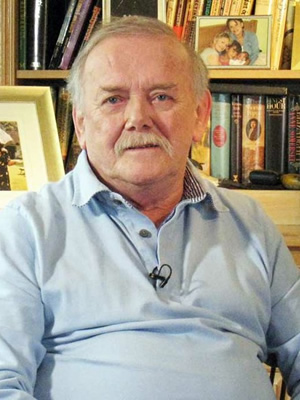
As you may have read, Bob Larbey died last week. The co-creator of some of Britain's best-loved sitcoms, often alongside writing partner John Esmonde, Larbey helped keep the nation laughing for well over 30 years.
We talked to Bob a couple of years ago about The Good Life - their best-known sitcom hit. Here's a transcript of the chat:
How did you did you meet and end up working with John Esmonde?
Well, we were at school together. We'd make each other laugh a lot, sometimes other people too! Then we did National Service - not together, but around about the same time - then went to work in offices. We'd meet for lunch quite a lot and moan over our egg and chips, saying "God, we've got to get out of this!" We just thought writing might be a way to do so, and it proved to be right.
So what was your first big break after deciding to go down that path?
That came after about 2 years of rejection slips and things - we sold a sketch to BBC radio, I think for five guineas! It wasn't actually in a little purse, but it was five guineas. And that was the start of it. Then we sold more and more sketches and then half hour radios, and then went from radio to television.
You've an impressive list of credits, but are best known for The Good Life. What prompted you to create that? The self-sufficiency story had already been tried by Harry Driver and Vince Powell with 1969's Two In Clover...
Oh, I didn't know that! No, The Good Life started with me being nearly 40 and John and I got talking - he was a little younger than I - and we were chatting about it being one of those milestone ages, you know? For no good reason, it's just one of those ages where people stop and go "Oh God, what am I doing? What have I done with my life? Where am I going, where have I been?"
We already knew Richard Briers, who was the same age as me, and that was really the start of our thinking: a man who reaches 40 and is just fed up. Fed up with what he's doing and with life generally. How does he break out of it? We hit upon self-sufficiency - but could just have easily decided that he bought a boat and sails around the world. Although that'd have been difficult to film!
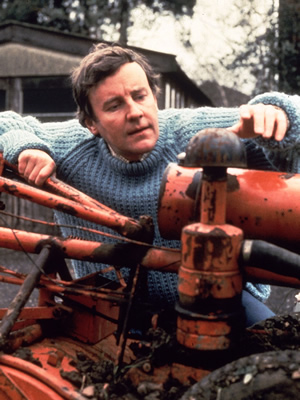
Did you have anyone in mind cast-wise when you were creating the show? You mention Richard Briers - or did that come later?
Richard was the only one, he was always going to be attached to it really. The rest came later. The BBC had said they wanted Richard Briers back - not that he'd ever really been away, but it'd been some time since he'd really done a sitcom at that stage - and asked us if we could create something for him. So he was more or less always attached, as long as he liked the idea obviously!
What are you particularly proud of being able to do with the show?
Ooh, I don't know. Making people laugh I suppose! That's got to be the end result of writing comedy, hasn't it? I mean, if you think "Oh my goodness me, there's several million people actually watching this" - that's a lot of people. And it's a nice thing to think that you made them laugh. That's it really!
Is there anything - not just with The Good Life, but through your whole career - that you would've liked to have tried, perhaps an idea you just couldn't get commissioned?
Yes. For me personally, it's that PG Wodehouse wrote some stories about golf. One collection called The Clicking of Cuthbert. They're little golf stories, told by the oldest member of a golf club, who sits on a balcony and recounts what're generally adventures about young people falling in love or out of love on a golf course. They're beautiful books, funny stories. I've personally tried to get this going several times with always the same response: it's about sport, and that doesn't work.
I've always tried to stress that golf is incidental to it; I mean there's some funny golf stuff, but they're all little romances, you know? It's PG Wodehouse so it's a little dated but it's all young men whose hearts are breaking because they're in love with young women with beautiful blue eyes, and how does he win her? That's the one project I've always wanted to do, but nobody's ever gone for it apart from me, so I seem to be in a minority of one!
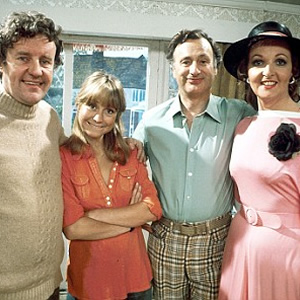
It's fairly regular now for stars and writers of classic comedy to complain, or express dissatisfaction with, modern comedy; that they don't think contemporary writers and/or broadcasters are really going for it, serving the audience, pushing boundaries in quite the way they used to... Do you have any thought on this?
I would have to agree. Another old curmudgeon! I mean, what we find is that so many people of a certain age say "Oh those were the days, when there were some good British situation comedies on". You know, some classics. But they don't seem to make them anymore.
Why? I don't know. There must be the writers about. For a while, the BBC in particular got so in love with demographics, obsessed with "we must get the 18-to-24s", to which our thinking was "Well if you're 18 to 24, what are you doing in on a Saturday night anyway?" Generally, you're not. You're out, you're enjoying life. It's the middle age and upwards who make up the bulk of the television audience but they seem to have got overlooked. I think that's why there's so much nostalgia for stuff like The Good Life, Fawlty Towers, Porridge... all those brilliant situation comedies. But there's nothing quite like that around anymore.
It just seems to me that they're missing an entire slice of potential audience. There doesn't seem the desire - I'm blaming the BBC, perhaps that's unfair to pin it squarely on them, I don't know - but they don't seem to be looking to create those kinds of programmes.
Another writer put to us recently that part of the problem was down to producers, wanting to be seen to be responsible for cool, edgy shows - that it sounds much better to be at a dinner party and talking about making a really boundary pushing show than to have made a traditional, mainstream and popular sitcom.
Yes, exactly. 'Edgy', I mean, that's a modern word, isn't it? I don't think they talked to us or Galton & Simpson or Clement & La Frenais about 'edgy comedy' - we wouldn't have known what they meant. It either had an edge or not. Take Steptoe & Son for example; it had this terrific edge if you want to talk about 'edgy'. It was near tragic at times, full of absolute drama as well as comedy. That was a total break-through. Till Death Us Do Part - how edgy do you want to get? In my opinion that was far more shocking than just a lot of bad language passing as comedy, which I think is what happens quite a lot these days. Old curmudgeon again...
Perhaps you wouldn't get half as many such programmes broadcast now for 'political correctness' and fear of causing offence?
Oh no exactly, absolutely not. They wouldn't touch such things these days. It's "ooh you can't say this, ooh you can't say that".
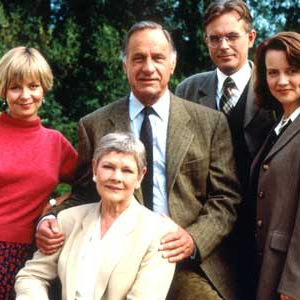
You touch on the proliferation of demographics and lost middle-aged viewer groups - were you consciously trying to tap into that gap with As Time Goes By?
No, I wasn't trying to tap into it as such; it was just that the age of the characters was right for me to write. I wouldn't have dared to attempt to write 18 year-olds. I don't know how 18 year-olds are now! I know how older people are though, and I know a little about romance, so put the two together and it was right for me. It's the 'write what you know' syndrome.
Are there any modern comedies you watch or listen to and enjoy?
I rarely sit down and consciously choose to listen to the radio - only in the car. Television I watch mostly sport, but comedy-wise it's American comedies. I think they've actually caught us up and gone past us now whereas years back it was the other way around. I'm currently liking Modern Family - I mean, that is just, I think, very, very funny. It's back to just being very, very funny. Also - I know it's finished now - but stuff like Frasier, that was excellent. There's not honestly been a British sitcom I'd stay in for. I don't want to be grouchy, but there's just honestly not that much around that makes me laugh, from the British end anyway.
There's quite a bit of talk from time to time about broadcasters no longer giving new formats a chance to bed in. Classics like Blackadder or Only Fools And Horses nearly didn't get past their first series...
Yeah. Back in the 'golden days', the BBC comedy department was more compact. They didn't have so many people in suits suddenly becoming experts in comedy without knowing anything about it. If the Head Of Comedy liked an idea, if they thought it had 'go' in it, they would stick with it. They did so with The Good Life - everybody assumes that was a smash, but it wasn't. It started off with very low figures. If it'd been on ITV, at that time they'd never have done a second series. But the head of comedy then - Jimmy Gilbert, I think - said "No we like it, we think it's going to work. Let's do another series." Then what they did was repeat the first lot and run it into the second, and suddenly - wallop! You know?
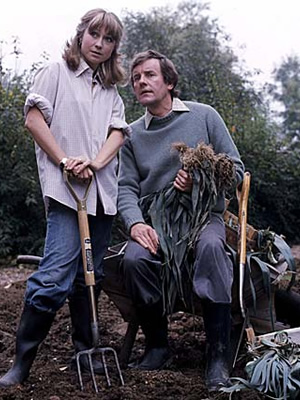
Perhaps there's something in the 'production values'. Broadcasters weren't quite so concerned with making something that looked no less than a Hollywood blockbuster; so it was cheaper, and there was more of a focus on the actual laughs?
Yes you have a good point. They were not generally glossy productions: it was four sets in a studio and a bit of filming, that was it.
It's changed a hell of a lot now. Presumably it's just people pursuing what they believe in and what they think is going to work. But I think that is what is wrong with modern focus groups and things. You can't just create a successful situation comedy, you can't say "what are the ingredients?" then chuck them together and have a hit. It either works or it doesn't.
People used to ask John and me what the secret was, we'd reply that if we knew that we'd be millionaires! You would; every time you sat done you'd just be like "well this is how you do it". But unfortunately all of these men in suits - which is all I can think of them as - have theories about it; you have to have this and you have to have that. That in itself I think is a stricture. It's putting a strait-jacket on writers now.
To return to The Good Life, is there any particular episode that's your favourite?
Hard to say! I think... yes, probably the one that's everybody's favourite. The writers' and the cast's favourite was the one called The Wind-Break War (Series 3, Episode 5), where they all got drunk - it's as simple as that. We were all sitting around one day and, quite casually I think, Richard Briers happened to mention "If you ever want me to get drunk, I'm quite happy to act it" and they all said "We'd like to do that!" So John and I thought "Oh bugger it, we'll just get everybody drunk". So we found that Jerry next door's always fancied Barbara and Margot almost fancies Tom, and just for a moment there was a hint of wife-swapping - obviously that was never going to happen, but it was fun, that episode. It was fun to do.
Of course it's well known that the Queen watched the show. What was your reaction when you first found out you had such a high-profile fan?
Well so they say, so they say! We thought 'good'! We never knew whether it was true or not, but yes word filtered down to the lower reaches where we lived that the Queen liked it. And I hope she did. She came and saw one, we called it The Royal Special, we wrote it especially and she came and watched it in the studio along with the audience and seemed to enjoy herself, but I don't know, we were all just over-awed I think.
The only calm person in the studio that night was Paul Eddington, I remember that! Richard was a gibbering idiot like John and me. Paul was just his very charming and urbane self!
Bob Larbey died on Monday 31st March 2014, aged 79. His comedy legacy includes beloved titles such as Please Sir!, Ever Decreasing Circles, The Good Life, As Time Goes By, Brush Strokes, On The Up, A Fine Romance, The Other One, Mulberry, Get Some In! and many more. His writing partner for many series, John Esmonde, died in 2008.
Help us publish more great content by becoming a BCG Supporter. You'll be backing our mission to champion, celebrate and promote British comedy in all its forms: past, present and future.
We understand times are tough, but if you believe in the power of laughter we'd be honoured to have you join us. Advertising doesn't cover our costs, so every single donation matters and is put to good use. Thank you.
Love comedy? Find out more